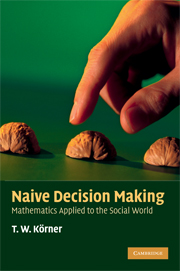Book contents
- Frontmatter
- Contents
- Introduction
- 1 A day at the races
- 2 The long run
- 3 The vice of gambling and the virtue of insurance
- 4 Passing the time
- 5 A pack of cards
- 6 Other people
- 7 Simple games
- 8 Points of agreement
- 9 Long duels
- 10 A night at the casino
- 11 Prophecy
- 12 Final reflections
- Appendix A The logarithm
- Appendix B Cardano
- Appendix C Huygens's problems
- Appendix D Hints on pronunciation
- Bibliography
- Index
Introduction
Published online by Cambridge University Press: 06 July 2010
- Frontmatter
- Contents
- Introduction
- 1 A day at the races
- 2 The long run
- 3 The vice of gambling and the virtue of insurance
- 4 Passing the time
- 5 A pack of cards
- 6 Other people
- 7 Simple games
- 8 Points of agreement
- 9 Long duels
- 10 A night at the casino
- 11 Prophecy
- 12 Final reflections
- Appendix A The logarithm
- Appendix B Cardano
- Appendix C Huygens's problems
- Appendix D Hints on pronunciation
- Bibliography
- Index
Summary
A well known newspaper columnist once wrote:
I studied maths to 16. I could sword-fight with a slide rule and consort with logarithms. As in Ronald Searle's St Trinian's, I could stalk the square on the hypotenuse and drop a surd at fifty paces. I ate quadratic equations for breakfast and lunched on differential calculus. It was completely pointless. For all the good it did me, I could have been parsing Mongolian verbs.
(The Times April 25, 2003)This book requires the knowledge and skill which the columnist believes he once had, together with a rather more open mind. Roughly speaking, it requires the tools available after two years of school or one year of university calculus. I assume the reader can use those tools readily and without too much effort.
The level aimed for is a year or so higher than that I envisaged for The Pleasures of Counting. In that book, I tried to offer something to those readers who skipped the mathematical details but, in this book, the mathematics is the message.
Students who have been trained to think of mathematics as being about finding right answers often find it hard to adjust to subjects like statistics which are about making decisions that may turn out to be right or wrong. The object of this book is to help readers think about how decisions are made and how mathematics can help the process.
- Type
- Chapter
- Information
- Naive Decision MakingMathematics Applied to the Social World, pp. xi - xviPublisher: Cambridge University PressPrint publication year: 2008



